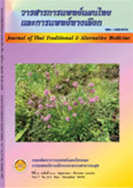Treatment of Irritable Bowel Syndrome by Acupuncture: A Study of One Case
Main Article Content
Abstract
Irritable bowel syndrome (IBS) is a functional bowel disorder characterized by abdominal pain together with diarrhea or constipation, or alternate between diarrhea and constipation without any detectable pathological disorder of the intestine. Gastrocolonoscopy will find no inflammation, ulcer, tumor or cancer and no diseases of other organs that would result in functional disorder of the bowel will be detected. IBS is a chronic disease that is not life-threatening but disabling and causing the patient suffering as available medications can relieve only the syndrome but cannot offer a cure for this syndrome. A case study of the treatment with acupuncture of a patient suffering from IBS showed that one month after treatment, the patient did not have abdominal pain, had little loose stool, daily bowel movement, and no constipation. Three months after acupuncture treatment, the patient became normal and did not have any more IBS symptoms. After follow-up for five years, no relapse of IBS was detected. The result of this case study suggests that acupuncture may offer a cure for IBS by inducing the balance of yin-yang, qi-blood and enable qi to flows smoothly. When qi flow smoothly, pain would be relieved. As yin-yang of the body becomes balanced, the patient would then be cured and become healthy again.
Article Details
References
2. Rhee PL. Definition and epidemiology of irritable bowel syndrome. Korean J Gastroentero1 2006;47:94-100.
3. Longstreth GF. Definition and classification of irritable bowel syndrome: current consensus and controversies. Gastroenterol Clin North Am 2005;34:173-87.
4. Hillila MT, Farkkila MA. Prevalence of irritable bowel syndrome according to different diagnostic criteria in a non-selected adult population. Aliment Pharmacol Ther 2004;20:339-45
5. Gwee Ka, Wee S, Wong ML, Png DJ. The prevalence, symptom characteristics, and impact of irritable bowel syndrome in an asian urban community. Am J Gastroenterol 2004;99:924-31.
6. Tian SL, Wang XY, Ding GH. Repeated electro-acupuncture attenuates chronic visceral hypersensitivity and spinal cord NMDA receptor phosphorylation in a rat irritable bowel syndrome model. Life Sci 2008;83:356-63.
7. Wu HG, Liu HR, Zhang ZA, Zhiu EH, Wang XM, Jiang B, et al. Electro-acupuncture relieves visceral sensitivity and decreases hypothalamic corticotrophin-releasing hormone levels in a rat model of irritable bowel syndrome. Neurosci Lett 2009;465:235-7.
8. Ford AC, Talley NJ, Schoenfeld PS, Quigley EM, Moayyedi P. Efficacy of antidepressants and psychological therapies in irritable bowel syndrome: systematic review and meta-analysis. Gut 2009;58:367- 78.
9. Lea R, Hopkins V, Hastleton J, Houghton LA, Whorwell PJ. Diagnostic criteria for irritable bowel syndrome: utility and applicability in clinical practice. Digestion 2004;70:201-3.
10. Lim B, Manheimer E, Lao L, Ziea E, Wisniewski J, Liu J,et al.Acupuncture for treatment of irritable bowel syndrome. Cochrane Database Sust Rev 2006;(4):CD005111.
11. Heizer WD, Southern S, McGovern S. The role of diet in symptoms of irritable bowel syndrome in adults: a narrative review. J Am Diet Assoc 2009;109:1204-14.
12. Singh N, Makharia GK, Joshi YK. Dietary survey and total dietary fiber intake in patients with irritable bowel syndrome attending a tertiary referral hospital. Indian J Gastroenterol 2008;27:66-70.
13. Zuckerman MJ. The role of fiber in the treatment of irritable bowel syndrome: therapeutic recommendations. J Clin Gastroenterol 2006;40:104-8.
14. ลือชา วนรัตน์, ทัศนีย์ ฮาซาไนน์, เย็นจิตร เตชะดำรงสิน (บรรณาธิการ). ศาสตร์การแพทย์แผนจีนเบื้องต้น. พิมพ์ครั้งที่ ๑. กรุงเทพฯ: โรงพิมพ์ องค์การสงเคราะห์ทหารผ่านศึก; ๒๕๕๑.
15. Hammer J, Talley NJ. Value of different diagnostic criteria for the irritable bowel syndrome among men and women. J Clin Gastroenterol. 2008;42:160-6.
16. Mearin F. Pharmacological treatment of the irritable bowel syndrome and other functional bowel disorders. Digestion 2006;73 Suppl 1:28-37.
17. Schneider A, Weiland C, Enck P, Joos S, Streitberger K, Maser-Gluth C, et al. Neuroendocrinological effects of acupuncture treatment in patients with irritable bowel syndrome. Complement Ther Med 2007;15:255-63.
18. Huang ZD, Liang LA, Zhang WX. [Acupuncture combined with massage for treatment of irritable bowel syndrome]. Zhongguo Zhen Jiu 2006;26:1328-30.
19. Reynolds JA, Bland JM, MacPherson H. Acupuncture for irritable bowel syndrome an exploratory randomized controlled trial. Acupunct Med 2008;26:8-16.
20. Schneider A, Enck P, Streitberger K, Weiland C, Bagheri S, et al. Acupuncture treatment, in irritable bowel syndrome. Gut 2006;55:649- 54.
21. Talley NJ. Placebo acupuncture improved symptoms and quality of life in irritable bowel syndrome. Evid Based Med 2008;13:180.
22. Sood MR. Treatment approaches to irritable bowel syndrome. Pediatr Ann 2009;38:272-6.
23. Amouretti M, Le Pen C, Gaudin AF, Bommelaer G, Frexinos J, Ruszniewski P,et al. Impact of irritable bowel syndrome (IBS) on health-related quality of life (HRQOL). Gastroenterol Clin Biol2006;30:241-6.


